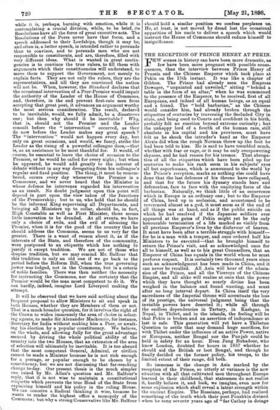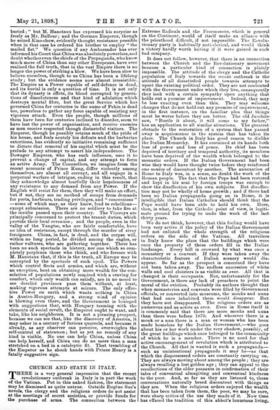THE RECEPTION OF PRINCE HENRY AT PEKIN. F EW scenes in
history can have been more dramatic, as few have been more pregnant with possible conse- quences, than the interview between Prince Henry of Prussia and the Chinese Emperor which took place at Pekin on the 15th instant. It was like a chapter of Gibbon. The Prince had already seen the Empress Dowager, "unpainted and unveiled," sitting "behind a table in the form of an altar," when he was summoned to the presence of the Emperor, to be received, first of all Europeans, and indeed of all human beings, as an equal and a friend. The " bold barbarian," as the Chinese would consider him, had already broken through the etiquettes of centuries by traversing the Secluded City in state, and being used to Courts and confident in his birth, probably felt no emotion beyond extreme curiosity ; but the unhappy lord of a fourth of the human race, still absolute in his capital and his provinces, must have felt as he shook the intruder's hand as the Emperor Alexis did when the rough Norman threw up the foot he had been told to kiss. He is said to have trembled much, whether with fear or rage, or it may be only overpowering shyness, and he had reason for his tremor. That abroga- tion of all the etiquettes which have been piled up for centuries to make his rank seem in his subjects' eyes all but superhuman, which is announced to the world by the Prince's reception, marks as nothing else could have done that the last defences of his throne have collapsed, and that for the future his dynasty stands bare and defenceless, face to face with the unpitying force of the barbarian. Naturally, we think little of an occurrence which in Europe is an ordinary one ; but to the Emperor of China, bred up in seclusion, and accustomed to be reverenced almost as a god, it must seem as if the end of all things was at hand, and as if the public suicide on which he had resolved if the Japanese soldiers ever appeared at the gates of Pekin might yet be the only honourable termination of a life marked so visibly from all previous Emperor's lives by the disfavour of heaven. It must have been after a terrible struggle with himself— for be is a man with a temper, and once ordered half his Ministers to be executed—that he brought himself to return the Prince's visit, and so acknowledged once for all to himself, as well as to his great Counsellors, that an Emperor of China has equals in the world whom he must perforce respect. It is certainly two thousand years since such an acknowledgment has been made in China, and it can never be recalled. All Asia will hear of the admis- sion of the Prince, and all the Viceroys of the Chinese Empire, and all alike will realise at once that the power which they have thought so nearly divine has been weighed in the balance and found wanting, and must after no long interval depart. In China itself the very sacredness of the Imperial throne will accentuate the loss of its prestige, the universal judgment being that the invisible powers have deserted it ; while all through the endless dependencies in Tartary, in Kashgar, in Nepal, in Thibet, and in the islands, the feeling will be that Pekin is broken and an assertion of independence at last is safe. This generation will yet have a Thibetan Question to settle that may demand huge sacrifices, for with Thibet under the influence of an active Power, native or European, neither Bengal nor the Punjab could be held in safety for an hour. Even Jung Buhadoor, who knew London, doubted for hours in 1857 whether he should aid the British or loot Bengal, and though he finally decided on the former policy, his troops, to the limited extent of their range, did both.
So immense is the change in Asia marked by the reception of the Prince, so utterly at variance is the new situation with all that cultivated men throughout Europe learned in their childhood, that statesmen do not realise it, hardly believe it, and look, we imagine, even now for some explosion which shall reveal a latent strength within the ancient Empire. The Russians, perhaps, had realised something of the truth which their poet Poushkin divined when he sang seventy years ago of "far Cathay in dotage buried; " but M. Hanotaux has expressed his surprise as freely as Mr. Balfour; and the German Emperor, though he seized Kiao-chow, evidently thought resistance possible when in that case he ordered his brother to employ " the mailed fist." We question if any Ambassador has ever informed his Court that China was absolutely powerles s, and doubt whethereven the chiefs of the Propaganda, who know much more of China than any other Europeans, have ever realised the full truth, that in the vast Empire there is no longer the power of striking a blow. We have been slow to believe ourselves, though to us China has been a lifelong study ; but the evidence seems now almost irresistible. The Empire as a Power capable of self-defence is dead, and its burial is only a question of time. It is not only that its dynasty is effete, its blood corrupted by genera- tions of dissoluteness and that kind of adulation which destroys mental fibre, but the great Service which has governed China for centuries in the name of Pekin is dead too, powerless to gather any force capable of resisting any vigorous attack. Even the people, though millions of them have been for centuries inclined to disorder, seem to have lost the power of organisation, and receive enemies as men receive respected though distasteful visitors. The Emperor, though he possibly retains much of the pride of his house, and feels acutely his defeats and the barbarian extortions, has evidently no initiative remaining sufficient to dictate that removal of his capital which must be the prelude to any attempt to assert his independence. The Dowager Empress, who has such influence, uses it to prevent a change of capital, and any attempt to form an active Army. The Counsellors, we imagine from the recent accounts of Prince Kung, differ violently among themselves, are almost all corrupt, and all engage in a perpetual warfare of intrigue, ending in this result, that they acknowledge almost tearfully their hopelessness of any resistance to any demand from any Power. If the English will resist for them, then they will make an effort, but if not, they see no method of escape from demands for ports, harbours, trading privileges, and " concessions " —some of which may, as they know, lead to rebellions— except submission. There are no soldiery to take fire at the insults passed upon their country. The Viceroys are principally concerned to protect the transit duties, which provide their local revenues ; and the people, even in the valley of the Yangtse, who are fairly comfortable, have no idea of resistance, except through the murder of stray foreigners. China, in fact, is dead, and the corpse will, within no long period, be divided among the eagles, or rather vultures, who are gathering together. There has been no such spectacle in history, nor one which so com- pletely perplexes those who think, and who foresee with M. Hanotaux that, if this is the truth, all Europe may be corrupted by the spectacle of such spoil. The Powers which control fleets and armies, and which are, without an exception, bent on obtaining more wealth for the con- solation of populations newly inspired with a craving for comfort, which only wealth can satisfy, are in no mood to see derelict provinces pass them without, at least, making vigorous attempts at seizure. The only effec- tive Power on earth which wants nothing in China is Austro-Hungary, and a strong wind of opinion is blowing even there, and the Government is besieged with suggestions that, with Hungary teeming with the elements of social revolt, the Emperor ought to want, and take, like his neighbours. It is not a pleasing prospect, because we can see that, like the discovery of America, it may usher in a century of furious quarrels, and because it already, as any observer can perceive, overweights the self-control of statesmen ; but as yet no remedy of any kind is visible. No one can help China, unless China can help herself, and China can do no more than a man stretched on a bed in a cataleptic fit. That trembling of the Emperor as he shook hands with Prince Henry is a fatally suggestive sign.



































 Previous page
Previous page